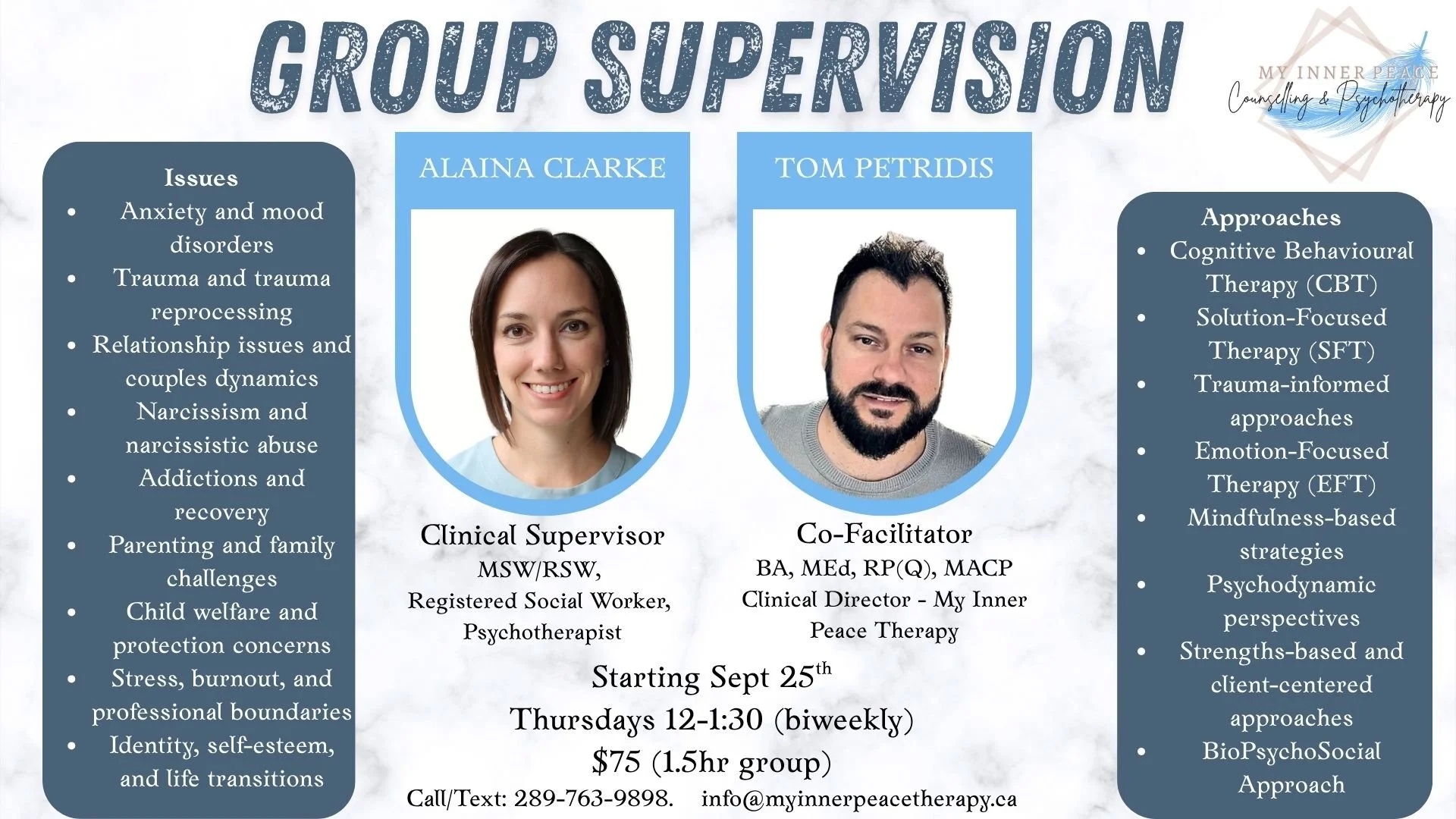Clinical Supervision
Alaina Clarke
MSW/RSW,
Registered Social Worker, Psychotherapist,
& Clinical Supervisor
“I have been in practice since 2012 with training/experience in CBT, anxiety and mood disorders, trauma/trauma reprocessing, relationship issues, and narcissism/narcissistic abuse. I have completed additional training specific to providing clinical supervision.
Clinical supervision is a supportive and collaborative space where a therapist meets with the supervisor to reflect on their work, share challenges, and celebrate successes. It’s a time to talk openly about cases, professional growth, and emotional well-being in a safe and encouraging environment. My goal is to provide guidance, build confidence, and ensure ethical, compassionate care for clients—while also caring for the therapist’s own development and resilience. Sessions are offered as individual or dyadic.”
What is Supervision?
Clinical supervision is more than a requirement — it’s a space for you to slow down, reflect, and grow in your work as a therapist. Whether you're just starting out or have years of experience, supervision offers a collaborative relationship where you can explore client work, navigate challenges, and build confidence in your clinical decisions.
In supervision, you’re not expected to have all the answers. Together, we’ll look at what’s coming up in your sessions — the stuck points, the questions, the emotions — and support you in understanding your own responses as a clinician. It’s a space where you can deepen your skills, stay connected to your values, and feel supported in the hard parts of this work.
Is Clinical Supervision with me the Right Fit for You?
Finding the right supervisor is an important part of your professional journey. You deserve to feel supported, seen, and guided by someone who understands the weight of this work and meets you with warmth, curiosity, and respect.
If you're looking for a supervisor who values reflective practice, encourages growth through gentle challenge, and holds space for both clinical skill and emotional resilience — we might be a good match. Whether you're seeking support with specific client concerns, navigating CRPO requirements, or simply want a safe place to think things through, supervision can offer that grounding.
Not sure if it’s the right fit? Let’s connect. I offer a free 15-minute phone consultation so you can ask questions, get a sense of my approach, and decide if this feels like the right space for you.
My Approach to Supervision
My work as a therapist is rooted in a trauma-informed, client-centered approach that I carry into the supervision space as well. I draw from a variety of therapeutic modalities including Cognitive Behavioural Therapy (CBT), Dialectical Behaviour Therapy (DBT), Narrative Therapy, and Emotion-Focused Therapy (EFT). I also integrate mindfulness and self-compassion practices to support both clients and clinicians in fostering resilience.
In supervision, I aim to create a collaborative and non-judgmental space where you can explore your work with openness and curiosity. I believe that effective supervision includes attention not only to clinical skill and case conceptualization, but also to your own development, boundaries, and emotional well-being as a therapist. Together, we’ll work to deepen your understanding of your clients, your interventions, and yourself.
Supervision as a Reflective Practice
Therapists often come to supervision looking for clarity — about their clients, their interventions, or their own internal reactions. Supervision offers a space to slow down and think out loud with someone who understands the work. With a calming, steady presence, I’ll support you in exploring both the clinical and emotional layers of your practice, helping you stay grounded, ethical, and aligned with your values.
Whether you’re navigating a complex case, feeling unsure of your next steps, or simply needing a space to reflect, supervision is where we hold space for those questions — without judgment, and with care.
CRPO Supervision Requirements
If you're a Registered Psychotherapist (Qualifying) or an RP working toward independent practice, the College of Registered Psychotherapists of Ontario (CRPO) requires ongoing clinical supervision as part of your professional development and registration process.
RP (Qualifying): The suggested supervision ratio is 1 hour for every 4.5 direct client hours.
RP (Not Yet Independent): The suggested supervision ratio is 1 hour for every 10 direct client hours.
Format Requirements: At least 50% of your supervision hours must be individual or dyadic, though up to 50% can be in a group setting.
For more details, please visit CRPO’s official supervision guidelines:
Supervision for RP (Qualifying)
Supervision for RP (Not Yet Independent)
Modalities & Approach
Attachment-based
CBT
Compassion Focused
Humanistic
Integrative
Person-Centered
Strengths-Based
Trauma Focused
Emotionally Focused


